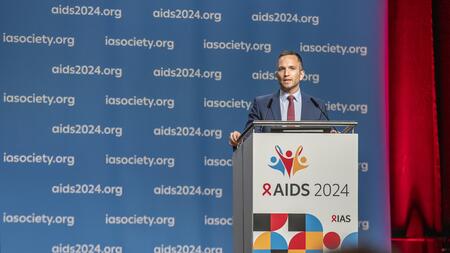The DZIF at the 25th International AIDS Conference "AIDS 2024" in Munich
Many DZIF researchers were represented at the most important meeting of scientists and non-scientists on HIV and AIDS
The 25th International AIDS Conference took place in Munich from 22 to 26 July. More than 10,000 guests from all over the world gathered in Munich. The five-day meeting brought together people living with, affected by and working on HIV. Numerous representatives of the DZIF also took part in the conference programme. DZIF infectiologist Prof. Dr Christoph Spinner was the local chair of the conference.
The first World AIDS Conference took place in Atlanta, USA, in 1985 and was last held in Germany in Berlin in 1993. In the almost 40 years since the first conference, scientists and non-scientists have achieved a great deal together: AIDS is now highly treatable. Unfortunately, however, many people do not have access to the available treatment options: In 2023, around 630,000 people worldwide died from AIDS-related diseases. "Many African, Eastern European and Asian countries are particularly affected. In Africa, Eastern Europe and Asia, for example, the number of new infections increased significantly between 2010 and 2019," says Prof. Christoph Spinner.
Prof. Spinner treats patients at the Interdisciplinary HIV Center (IZAR) at Klinikum rechts der Isar of the Technical University of Munich. At the German Center for Infection Research, he conducts research into the interactions and side effects of antiretroviral therapy, which keeps the HI virus in check, as well as HIV prevention. Although a functional cure is possible with today's drugs, a sterilising cure that leads to the complete elimination of the HI virus from the body does not yet exist. A definitive cure has only been achieved in a few cases to date. In addition, the prophylactic use of antiviral medication is an effective prevention strategy for vulnerable groups with an increased risk of HIV. “Incidentally, successful antiviral therapy for people with HIV also protects against transmission. The principle is known as protection through therapy”, explains Prof. Spinner.
Much remains to be done to improve access to information, prevention and treatment, says Prof. Spinner in the run-up to the congress. In addition, many people with HIV are still affected by stigmatisation and exclusion.
The DZIF dedicates a specialised research area to HIV/AIDS. Some of the research results were presented and discussed at "AIDS 2024":
Language (mis)use in HIV research communications
Many people living with HIV have experienced trauma, racism or a lack of empathetic communication when interacting with healthcare providers. This can lead to rejection of health measures and scepticism towards scientific findings in general. A conscious and sensitive approach to language is therefore important in order to offer those affected the best possible access to prevention and treatment.
As part of a workshop and a panel discussion, DZIF scientists invited participants to work on solutions for language barriers between communities. The workshop was organised by DZIF scientist Dr Ulrike Lange, Leibniz Institute of Virology (LIV), and Sydney Norman, Programme Coordinator of the HOPE network.
During the panel discussion, DZIF HIV researchers Dr Angelique Hölzemer (LIV) and Dr Frauke Mücksch (Heidelberg University) as well as Marc Franke, representing the HIV community on the still young DZIF Patient Advisory Board, joined Alecia Tramel-McIntyre and Raif Derrazi—both members of the HOPE Community Advisory Board—for a discussion. Among other things, they discussed how language can be used sensitively when presenting scientific results and in questionnaires and how science can be translated into concrete measures and interventions on the ground.
Immune control of viral reservoirs
New targeted immunotherapies are an important focus of further research into HIV treatment options that aim to achieve remission or even a cure. Under the coordination of Prof. Marcus Altfeld, the DZIF HIV research area organised a satellite symposium on the topic of "Immune control of viral reservoirs" together with the "RHIVIERA" working group from the French research institution "ANRS | MIE". DZIF representatives and international experts gave an overview of the current state of research and discussed what conclusions should be drawn for further research into curing HIV. DZIF scientist Philip Schommers was also present at the satellite symposium. He shared research findings on broadly neutralising antibodies and their role in future therapeutic approaches.
Donation for HIV research enables young DZIF scientists to participate in AIDS 2024
Many other DZIF researchers took part in the global exchange at AIDS 2024. A generous donation of €5,000 to the HIV research area enabled twelve young DZIF scientists to attend the event—a great opportunity for them to network with the international community: Students and post-docs working on DZIF HIV projects were eligible to apply for travel grants. The selected young scientists presented the results of their HIV projects in poster presentations at AIDS 2024. These included several projects on immune control of viral reservoirs and the therapeutic use of broadly neutralising antibodies.
The next international World AIDS Conference will be held in 2025 in Kigali, Rwanda. There will certainly be valuable contributions from DZIF researchers again!




